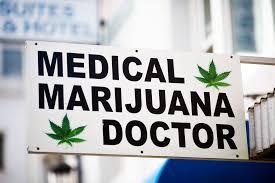
Americans love myths and hoaxes. Unicorns are very popular with small children; and even though most know that they are not real, they still love to play with them just the same. And then there are adults who believe in alien abductions. Some believe that America didn’t really put men on the moon, arguing that it was all just an elaborate hoax filmed in Hollywood using special effects. Others think that “Piltdown Man” is real and still a link of the human evolutionary chain. And of course some believe that our own government was behind the 911 attack. All of these are hoaxes and myths. However, the greatest hoax promoted today is the concept of “medical marijuana.”
Now before continuing, I would first like to make an important qualification. I have no doubt that within the differing types of marijuana plants around the world that there may be chemical compounds that have legitimate medical benefits, and with thorough research they can be harnessed and standardized for productive medical usages. But that is not what is being promoted today by the term “medical marijuana.” This term is used as a propaganda tool in order to promote the idea throughout America that marijuana can be a good thing; consequently, recreational marijuana is not all that bad.
First, there are a few facts one should know about marijuana. Marijuana is addictive just like morphine and cocaine. The CDC states that 1 out of 10 adults that regularly use marijuana become addicted to it, and among teenagers that percentage rises to 1 out of 6. Furthermore, one side effect of marijuana is that it changes a person’s personality and motivation, especially if used while a teenager. It turns many who are transitioning from youth to adulthood from potentially functional and productive citizens, to apathetic and directionless addicts—this I have seen with my own eyes. Secondly, marijuana is a carcinogenic, which means it can cause cancer. In case you have never learned how one smokes marijuana, then you should know that the key to getting a high is to inhale the smoke into your lungs as deeply as possible and then hold it there for as long as possible (I know this because even though I never used marijuana, I grew up with a lot of kids that grew it for themselves). This practice of holding smoke in one’s lungs enables THC to get into the blood stream sooner and more thoroughly, thereby receiving a greater “high.” The problem with this practice it also embeds carcinogenic compounds more systemically throughout one’s lungs. This issue is exacerbated when you realize after a while users begin to experience highs that are both shorter and less intense. Consequently, they begin searching for more potent strands of marijuana, and in their constant search for higher highs they not only inhale it more deeply, but they also inhale it in greater amounts as well. Consequently, marijuana is a danger to one’s emotional, physical, and psychological stability, and threatens one’s ability to think and behave in a mature and productive manner. Lastly and regrettably, for many others marijuana has been a gateway drug to more harmful and addictive drugs—the evidence for which is undisputable.
Now just a few facts about how pharmaceuticals are approved in the United States. The FDA mandates that not only must potential medications go through a strenuous multistage research process involving years or even decades, but also that the entire research methodology must meet their exacting standards. So, the FDA not only has oversight with respect to which drugs may be approved for development, but it also demands that the research method for potential medications must produce a standardized and reproducible result, and this is done so that the results of the research can be verified through duplication. This entire process is how the FDA ensures a drug’s health benefit. While some may criticize what the FDA requires and what it allows with respect to pharmaceutical research, the fact is that this process has produced some of the most effective and beneficial medications used throughout the world today. I know this because my father worked for several pharmaceutical companies and has even represented some of them at the FDA’s headquarters in Maryland.
So what is really happening with the concept of “medical marijuana?” First of all, the concept of “medical marijuana” is a complete farce. FDA approved “medicines” must meet controlled standards that ensure that the proper amount of the active ingredient is actually dispensed per dosage. Receiving a safe dosage is not possible when smoking a joint purchased from a legal medical cannabis dealer (which is now legal in 32 states), or was grown in his or her backyard. And while our country is plagued with an opioid crisis, a minority of Americans is fighting for the right to use marijuana at will. Even ex-House Speaker John Boehner has become an informal spokesman for the marijuana industry. The growing attitude towards recreational cannabis seems to be that people have a right to smoke marijuana as a part of their “pursuit of happiness.” That clause in our nation’s Declaration of Independence is not a suicide pact between the individual and America’s greater culture. If an individual’s pursuit of happiness guarantees harm to 1000s of others, then that individual is ethically bound to find a new pursuit. For example, if the president of Ford asserts that he is happiest by producing vehicles that explode into pieces when involved in a minor fender bender, then it doesn’t matter that his happiness may be suppressed, the American government is justified in protecting the American people by not allowing Mr Ford to produce cars that are known to be dangerous. It doesn’t matter if Mr Ford never experiences a fender bender where his car own blows up, the fact is that others will be harmed badly by his cars; consequently, he is ethically and legally prohibited from his “pursuit of happiness.” Nevertheless, while the American population is being deceived into thinking marijuana is really a good thing, our state governments are no longer interested in fighting to protect our communities from this dangerous hoax. Instead, they see commercialized marijuana as just another tax revenue stream. And there is one last consideration with respect to medical marijuana, if you think medical malpractice is a problem for the American healthcare system, how many lawyers can you imagine are waiting in the wings for the chance to file suits on behalf of patients that were either injured in accidents while under the influence of cannabis, or contracted cancer or other debilitating diseases because it was prescribed to them? If you think you are tired of class action lawsuit commercials now, then you haven’t seen anything yet.
So what is the point of this blog? The point is that as marijuana usage increasingly becomes normalized (whether illegal, recreational, or even medical usage), then churches will need to develop a biblical position that addresses what will be acceptable behavior from their leaders, as well as what will be tolerated within their official ministries, on their properties, and at their facilities. And if you think this is just a big to do about nothing, I actually know of an Evangelical minister that has tolerated marijuana usage in his own the home; and to my knowledge he has yet to be fired. Regrettably, one thing I know from personal experience about marijuana users is this, they are evangelistic about marijuana! While the church may not be concerned with promoting the benefits of the gospel of the Lord Jesus Christ, marijuana users are never shy about what great “fun” you can have by getting stoned with them. Even though marijuana is never mentioned in the Bible, we are told that we should never be adversely influenced or controlled by any mood or mind altering substances, but instead we are to be under the constant guidance and influence of the Holy Spirit (Eph 5.15-18; Luke 21.34-36; 2 Tim 2.2). It is not well-defended suggestion to assert that although Paul and Jesus condemned drunkenness, they would have been okay with smoking an occasional joint in order to enhance one’s creativity and relaxation. Moreover, churches need to come to grips with the fact that they will lose attendees because they take a stand on the dangers involving marijuana usage. And don’t be surprised if they don’t leave quietly, the scriptures clearly state that they will also attempt to smear your church’s reputation before others (1 Peter 4.1-4). Do addicts and drug users need the Lord, they surely do. Do some believers become addicts, regrettably this is also true. Nevertheless, while Jesus may have turned water into wine, he certainly would not have rolled a joint or fired up a bong. Consequently, the church needs to prepare itself with a well-grounded biblical perspective concerning drug abuse; as well as a compassionate and effective ministry that receives those seeking refuge from its life draining side effects. One of today’s greatest hoaxes is the concept of “medical marijuana,” and believing that drug use is not really a concern for the church is as helpful as playing with unicorns.
Copyright @ 2018 Monte Shanks

